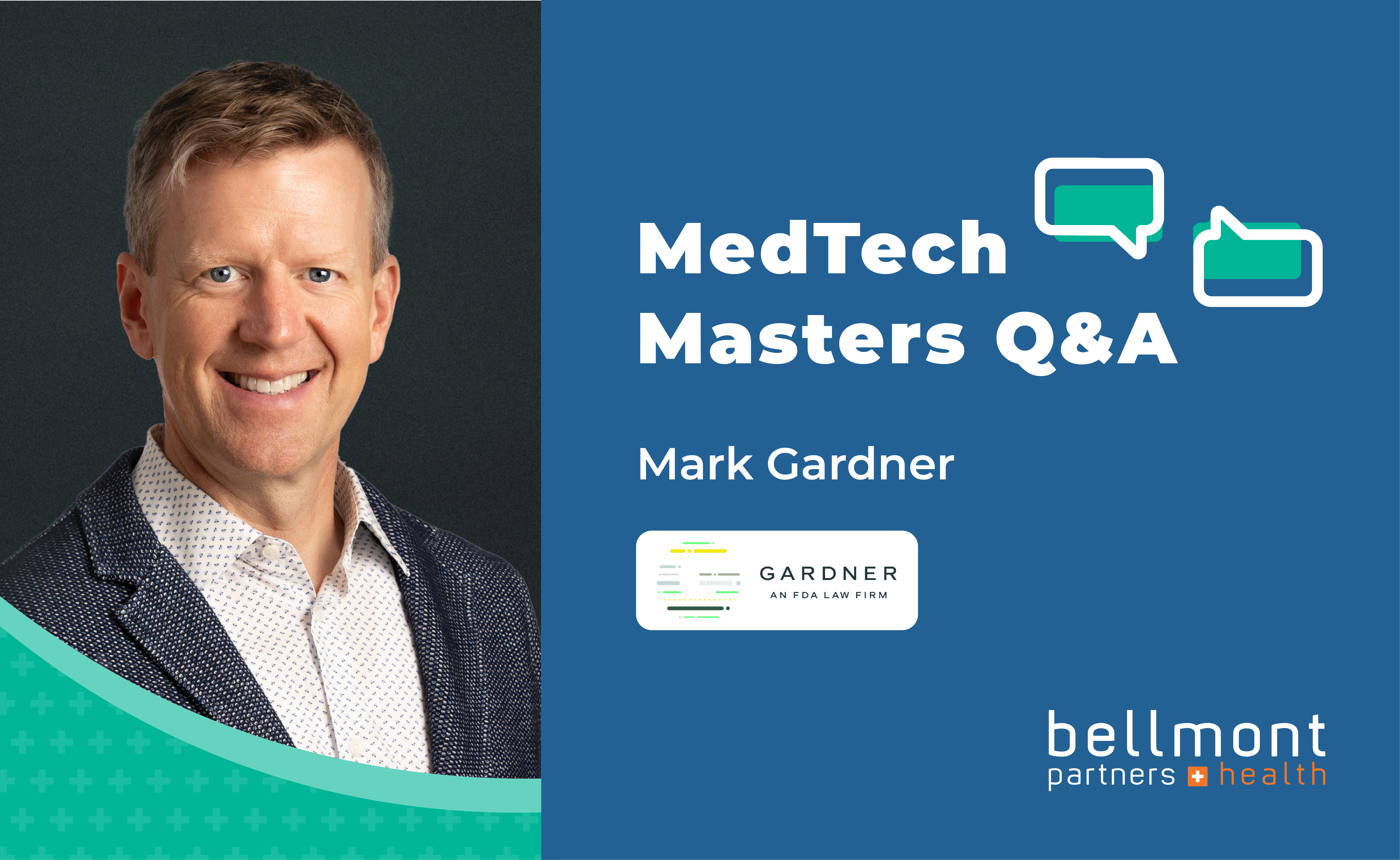As the Bellmont Partners Health team continues its 15th anniversary celebration this month, we are highlighting our health clients and the medtech community. Next up in our Medtech Masters Q&A series, is a conversation with Mark Gardner, founder and managing partner of Gardner Law and Chrysalis Incubator.
Mark Gardner, MBA, Esq., is an attorney, professor, and entrepreneur with 25+ years in healthcare. He founded Gardner Law and Chrysalis Incubator, guiding FDA-regulated companies and innovators through legal and business challenges. Mark teaches at Mitchell Hamline School of Law, the Carlson School of Management, and the University of Minnesota Law School. He previously held commercial roles in medtech and biotech and regularly speaks on AI in healthcare and FDA regulation.
How did you get started in the medtech industry? What is your background?
My start in healthcare was in 1999 at Medtox Laboratories where I focused on commercialization of laboratory services and diagnostic devices. While working at the lab, I graduated from business school and started attending law school on nights and weekends. From there I went on to work as a product manager at companies in the wound care and cardiology spaces. These days I work in healthcare as an attorney, professor, and entrepreneur. I founded Gardner Law, which caters to FDA-regulated companies. I also founded Chrysalis Incubator, where we guide inventors and medical device companies through the complexities of bringing innovative medical technology to market.
Tell us a little bit about Gardner Law — what areas do you specialize in and what kinds of clients do you serve?
At Gardner Law, all our clients are related by the FDA. That’s the common denominator. We assist medical device, pharmaceutical, biologic, health tech, laboratory, food, cosmetic, and other companies regulated by the agency, on regulatory, healthcare compliance, privacy, litigation and business matters.
What are the trends you’re seeing in the medtech industry now, in terms of the things companies are coming to you for help with? How has this changed over the years?
The biggest and most recent changes involve the integration of AI into medical technology, an explosion in the wearables and health tech sector, more regulation on the state level, and an increase in privacy and security demands on our clients. These are all relatively recent developments. We continue to see an interest by leadership at the DOJ and OIG in combating fraud, abuse, and waste in the healthcare industry. As well as an agency that places high demands on anyone selling an FDA-regulated product that impacts the American public. Regulation of the industry never seems to go backwards. At least I haven’t seen that happen in my 26 years working in the industry.
What role does communications play in some of the challenges you help your medical device/tech clients navigate?
FDA-regulated industry is a high-stakes place to conduct business. People’s lives are at stake. Violators can go to jail and/or be excluded from working in the industry. Therefore, having clear communication, especially when dealing with a crisis is critical. Beyond that, firms regulated by industry are compelled by regulators to be transparent and articulate when it comes to disclosing safety and efficacy information about their products. We work with public relations experts to make sure our clients are communicating effectively.
We understand you also recently co-founded an incubator for medtech startups. Can you tell us a bit about that?
Since launching earlier this year, my partners and I are having an absolute blast assisting inventors of new medical technologies whose goal it is to take an idea for a new medical technology and make it a reality. We founded Chrysalis Incubator with the goal of helping people navigate the increasingly difficult chore of getting new medical technologies into the hands of healthcare providers. When founding the company, we expected to hear mostly from physicians. We’ve been delighted to find that engineers and laypeople are coming to us with their ideas. My partners include Darryl Barnes, MD, a Mayo-trained surgeon, inventor, and medtech entrepreneur; Brendan Pittman, MBA, a tried-and-true medtech business executive who spent time at Medtronic and Boston Scientific, among other companies; and Ben Tramm, EE, Esq., a renowned intellectual property attorney who has gotten hundreds of medical devices patented and also spent time at Medtronic as an electrical engineer. The common theme among me and my colleagues is that we’ve done the work that it takes to get a medical device from idea to standard of care. We’re not just cufflinks and wingtips; we’re operators that have spent our careers doing the hard work that we advise our clients on. This is what sets us apart.
We are grateful to Mark for sharing his insights with us and for the important work that he and his partners do in helping their clients navigate and solve challenges within the complex regulatory world of medtech every day.
ICYMI, check out our last Q&A with Frank Jaskulke, vice president of sales and business development at Avio Medtech Consulting and stay tuned for the next installment in our series!
Do you have a life-changing innovation and are looking for help to bring it market? We’d love to hear more about it! Contact us for a complimentary PR strategy session and brainstorm.

